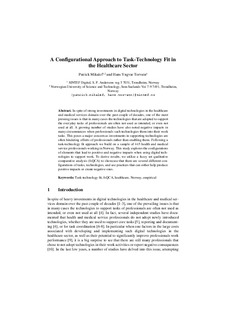| dc.contributor.author | Mikalef, Patrick | |
| dc.contributor.author | Torvatn, Hans Yngvar | |
| dc.date.accessioned | 2019-12-02T14:18:22Z | |
| dc.date.available | 2019-12-02T14:18:22Z | |
| dc.date.created | 2019-11-19T14:00:19Z | |
| dc.date.issued | 2019 | |
| dc.identifier.isbn | 978-3-030-29374-1 | |
| dc.identifier.uri | http://hdl.handle.net/11250/2631303 | |
| dc.description.abstract | In spite of heavy investments in digital technologies in the public sector over the past couple of decades, one of the most important issues regarding the value realized from them is that in many cases he technologies used to support tasks of professionals are often not used as intended, or even not used at all. Apart from not perceiving any positive impacts, several studies have noted negative effects when professionals incorporate different novel technologies into their work tasks. Building the task-technology fit theory and based on a recent sample of 228 professionals working in Norwegian public administration and management bodies, this study uncovers the configurations of elements that lead to positive and negative impacts when using digital technologies to support work. We apply a fuzzy set qualitative comparative analysis (fsQCA) to demonstrate that there are several alternative configurations of tasks, technologies, and use practices that can either help produce positive impacts or create negative ones. | nb_NO |
| dc.language.iso | eng | nb_NO |
| dc.publisher | Institute of Electrical and Electronics Engineers (IEEE) | nb_NO |
| dc.relation.ispartof | Digital Transformation for a Sustainable Society in the 21st Century. 18th IFIP WG 6.11 Conference on e-Business, e-Services, and e-Society, I3E 2019, Trondheim, Norway, September 18–20, 2019, Proceedings | |
| dc.title | An Examination of Task-Technology Fit in Public Administration and Management: A Configurational Approach | nb_NO |
| dc.type | Chapter | nb_NO |
| dc.description.version | acceptedVersion | nb_NO |
| dc.identifier.doi | 10.1109/CBI.2019.00047 | |
| dc.identifier.cristin | 1749472 | |
| dc.description.localcode | © 2019 IEEE. Personal use of this material is permitted. Permission from IEEE must be obtained for all other uses, in any current or future media, including reprinting/republishing this material for advertising or promotional purposes, creating new collective works, for resale or redistribution to servers or lists, or reuse of any copyrighted component of this work in other works. | nb_NO |
| cristin.unitcode | 194,63,10,0 | |
| cristin.unitname | Institutt for datateknologi og informatikk | |
| cristin.ispublished | true | |
| cristin.fulltext | preprint | |
| cristin.qualitycode | 1 | |
